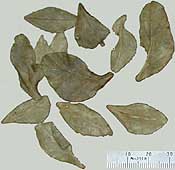
page updated 27th January 2008 |
Common Name: Mount White Lime |
Mount White, Cape York Peninsula, near Coen Lat. 13� 55' S., Long. 145� E., altitude 1,300 ft. |
Queensland Herbarium reproduced with permission |
Quote from article by Erika Birmingham in 'The Australian New Crops Newsletter' of
July 1998:- "This is the last of the Australian native citrus species to be discovered. The species is endemic to the foothills and upland rainforest of the Cook District, Mt White on Cape York Peninsula in Australia and Goodenough Island in Papua New Guinea. It grows in deciduous vine thickets as an under-storey shrub and has been recorded at a height of 15m. Due to its limited distribution, this species is now classified as rare and is protected under the Queensland Nature Conservation Act 1992. It is similar to the finger lime, but has broader leaves. The flowers are single, axillary and the tree bears fruit from April to November. The fruits are also 'finger-shaped', with a green skin and greenish-white pulp on maturity. The fruit have fewer cells than the finger lime, a thicker skin (up to 2mm) containing large oil glands and weigh an average of 25g." |
F. M. Bailey first described this species as follows: "Fruit upon the slender branchlets oblong, 2 1/2 in. long, 14 lines diameter. Oil glands large, giving a tuberculose appearance to the fruits; ultimately these glands sink, and the fruit appears then to be lacunose; rind very thin; cells 4 or 5; pulp of a sharp agreeable acid; seeds 3-angular, white, free, with more or less very short hairs, about 3 lines long and 2 lines thick in the centre." [A 'line' =1/12" =2mm(approx), so Bailey's fruit size is about 6cms long, 3cms diameter] |
leaves of type specimen (first one ever collected) |
type specimen original label |
This drawing is taken from the 1909 second edition of the book by F.M. Bailey entitled
'Comprehensive Catalogue of Queensland Plants Both Indigenous and Naturalised'. |
The only published picture of the fruit that I have been able to find. |
This is my very small grafted plant of C.garrawayi in early 2004. It is about 6"
(15cms) tall. The leaf form, and the slender twigs, seem to match well with the
Kershaw Gardens specimen. |
A few pure white flowers grew in 2004, but dropped off without forming fruit. |

formerly Microcitrus garrawayi |
Other names no longer considered valid: Microcitrus garrowayi, Citrus garrowayi, Microcitrus garrawayae, Citrus garrawayae |
Early 2008 brought the first fruit (possibly the first ever grown in the UK), although
I think it may have dropped before being fully ripe. Dark green on one side
and with just a hint of lighter yellow-green on the other, the peel, even when
scratched, lacked any citrus fragrance. The flesh was slightly dry and crunchy.
|
The left group of photos, again from Kershaw Gardens, were taken in August 2003 by
Colin Lindsey of SGAP. Colin says that the original tree has two fruiting seedlings next to it, and many younger seedlings. The third picture provides a comparison of the mature and juvenile foliage. I was surprised by the totally cylindrical shape of the fruit. There is no hint of Bailey's ellipsoid fruit, and they even seem different to the Nicholson pictures. But Bailey's "tuberculose appearance" certainly applies. |
The photos above, taken in Kershaw Gardens, Rockhampton, Queensland, were sent to
me by the photographer Hugh Nicholson. See www.rainforestpublishing.com.au . The clarity and resolution of these pictures is not great, but the shape of the fruit seems to match Bailey's illustration. Now having an exact location for this tree, I persuaded some Rockhampton members of the Society for Growing Australian Plants to take some more photos for me! |
This first fruit was about 3.5 cms long and 1.5cms diameter, with four segments and
no seeds. |
Unlike all the other Australian native citrus I have tasted
so far, this fruit had no overpowering acidity or bitterness. In fact, it had
little flavour at all, apart from a slightly perfumed after taste. |
My Microcitrus garrawayi tree in January 2008. It is now about 1m tall. |